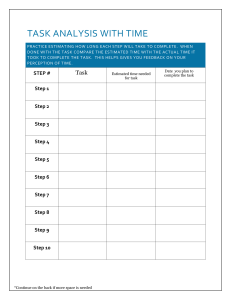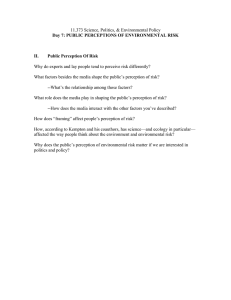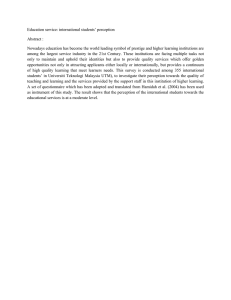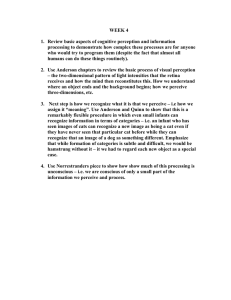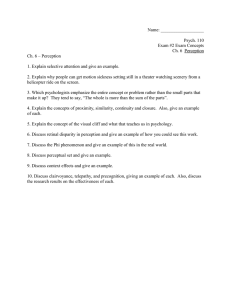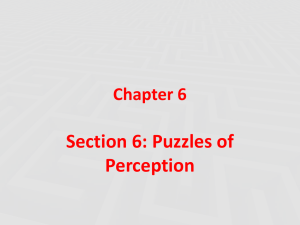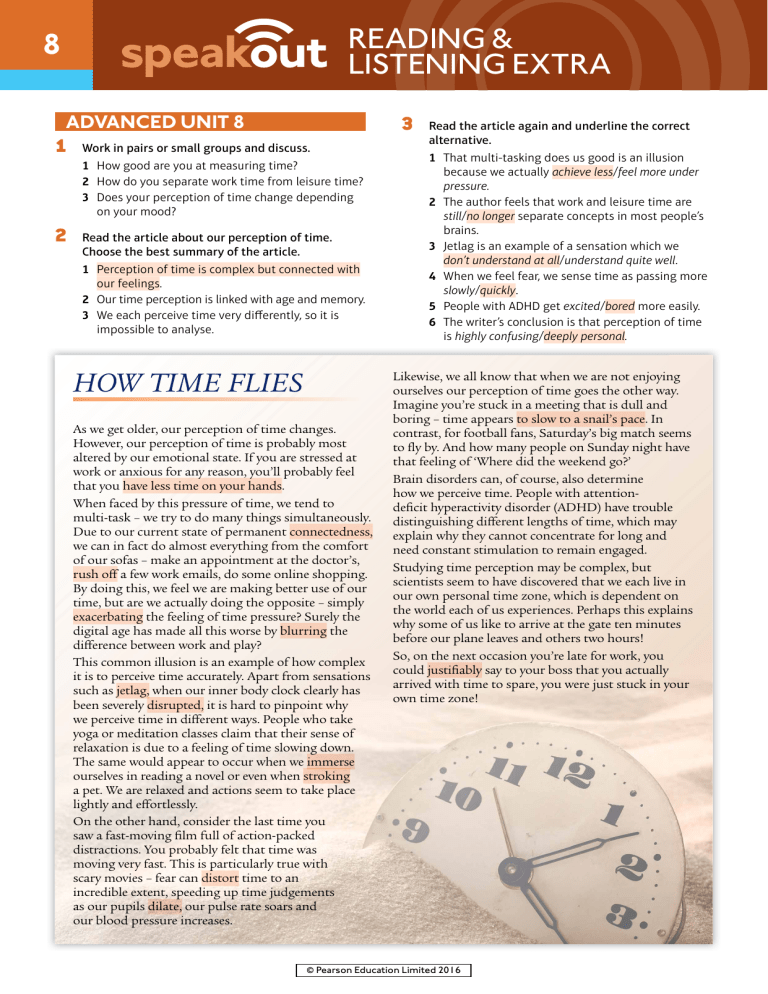
READING & LISTENING EXTRA 8 ADVANCED UNIT 8 1 2 3 Work in pairs or small groups and discuss. 1 How good are you at measuring time? 2 How do you separate work time from leisure time? 3 Does your perception of time change depending on your mood? Read the article about our perception of time. Choose the best summary of the article. 1 Perception of time is complex but connected with our feelings. 2 Our time perception is linked with age and memory. 3 We each perceive time very differently, so it is impossible to analyse. HOW TIME FLIES As we get older, our perception of time changes. However, our perception of time is probably most altered by our emotional state. If you are stressed at work or anxious for any reason, you’ll probably feel that you have less time on your hands. When faced by this pressure of time, we tend to multi-task – we try to do many things simultaneously. Due to our current state of permanent connectedness, we can in fact do almost everything from the comfort of our sofas – make an appointment at the doctor’s, rush off a few work emails, do some online shopping. By doing this, we feel we are making better use of our time, but are we actually doing the opposite – simply exacerbating the feeling of time pressure? Surely the digital age has made all this worse by blurring the difference between work and play? This common illusion is an example of how complex it is to perceive time accurately. Apart from sensations such as jetlag, when our inner body clock clearly has been severely disrupted, it is hard to pinpoint why we perceive time in different ways. People who take yoga or meditation classes claim that their sense of relaxation is due to a feeling of time slowing down. The same would appear to occur when we immerse ourselves in reading a novel or even when stroking a pet. We are relaxed and actions seem to take place lightly and effortlessly. On the other hand, consider the last time you saw a fast-moving film full of action-packed distractions. You probably felt that time was moving very fast. This is particularly true with scary movies – fear can distort time to an incredible extent, speeding up time judgements as our pupils dilate, our pulse rate soars and our blood pressure increases. Read the article again and underline the correct alternative. 1 That multi-tasking does us good is an illusion because we actually achieve less/feel more under pressure. 2 The author feels that work and leisure time are still/no longer separate concepts in most people’s brains. 3 Jetlag is an example of a sensation which we don’t understand at all/understand quite well. 4 When we feel fear, we sense time as passing more slowly/quickly. 5 People with ADHD get excited/bored more easily. 6 The writer’s conclusion is that perception of time is highly confusing/deeply personal. Likewise, we all know that when we are not enjoying ourselves our perception of time goes the other way. Imagine you’re stuck in a meeting that is dull and boring – time appears to slow to a snail’s pace. In contrast, for football fans, Saturday’s big match seems to fly by. And how many people on Sunday night have that feeling of ‘Where did the weekend go?’ Brain disorders can, of course, also determine how we perceive time. People with attentiondeficit hyperactivity disorder (ADHD) have trouble distinguishing different lengths of time, which may explain why they cannot concentrate for long and need constant stimulation to remain engaged. Studying time perception may be complex, but scientists seem to have discovered that we each live in our own personal time zone, which is dependent on the world each of us experiences. Perhaps this explains why some of us like to arrive at the gate ten minutes before our plane leaves and others two hours! So, on the next occasion you’re late for work, you could justifiably say to your boss that you actually arrived with time to spare, you were just stuck in your own time zone! © Pearson Education Limited 2016 READING & LISTENING EXTRA 8 4 Complete the sentences with the correct form of the verbs in the box. 7 tend exacerbate blur pinpoint immerse yourself stroke distort distinguish immerse myself 1 I like to in reading a good book or watching a great film. 2 I’m freelance, so I o"en find it hard to distinguish between leisure and work time. my 3 When I’m stressed, I love stroking pet cat, Felix. Time slows down and I feel instantly better. 4 Multi-tasking only exacervates stress, I think. Doing everything at the same time is not the answer! 5 This film plays with your perception of time, and the line between reality and it blurs fantasy. to wear 6 I have a mobile phone but I tend a watch too because it’s easier to tell the time. how hard it is to 7 The article pinpoints measure our perception of time. 8 When I arrived I didn’t know what time it was, nor the day: Jetlag can really distort everything. 5 6 Work in pairs or small groups and discuss. 1 Do you agree with the article about how we perceive time? 2 Which of the situations described in the article do you identify with, if any? 3 Do you think you judge time well? Why/Why not? Give examples. a) He/She believes that his/her example may be one that is felt by others. b) He/She thinks that his/her anecdote could be his/her own personal problem. c) He/She talks about an event which happens rarely. d) His/Her perception of time can vary a great deal when doing the same action. e) He/She refers to a sense of timelessness. f) How he/she feels may prompt a sense of losing track of time. g) He/She refers to something that could alleviate his/her problem. h) His/Her context is related to a stressful situation. i) His/Her anecdote is strongly associated with the effect of the weather. j) He/She refers to a particular moment when he/she judged the time wrong. 8 Lucy Times goes Taking a long time to get off a plane slowly 1 If you’re not able to keep still because of boredom or anxiety, you feel restless . 2 If you’re extremely tired and have no energy, you have a feeling of exhaustion . time, you feel really happy 3 If you treasure because you are doing something that you like. 4 If time drags on , it’s because something is continuing for longer than it should. 5 If you feel exhilarated , you’re full of energy and really excited about something. 6 If you lose track of time, you no longer know what time it is. 7 If you’re housebound, you’re unable to leave your house on your own because of illness or disability. around the house, you do 8 If you potter things slowly and in an enjoyable way. Christian Rachel Sandra Kathryn fast endorphins, serotonin half-way: forever marathon keep herself busy, enjoys on and on younger, much fly by beach, lose track of time, in suspension relaxation The words in the box are from the recording. Complete the sentences with the correct form of the words in the box. restless treasure exhilarated drag on exhaustion housebound potter lose track 8.1 Listen to five people talking about how differently they perceive time. What context do they talk about? Does time go quickly, slowly or both for them? Complete the table. Context Listen again. Match the speakers 1–5 with the facts a)–j). There are two facts per person. b 1 Lucy , h c , j 2 Christian d , f 3 Rachel a , g 4 Sandra i , e 5 Kathryn 9 Work in pairs or small groups and discuss. 1 Which of the people in the recording do you identify with? Why? 2 When does time pass particularly quickly or slowly for you? Give examples. © Pearson Education Limited 2016
